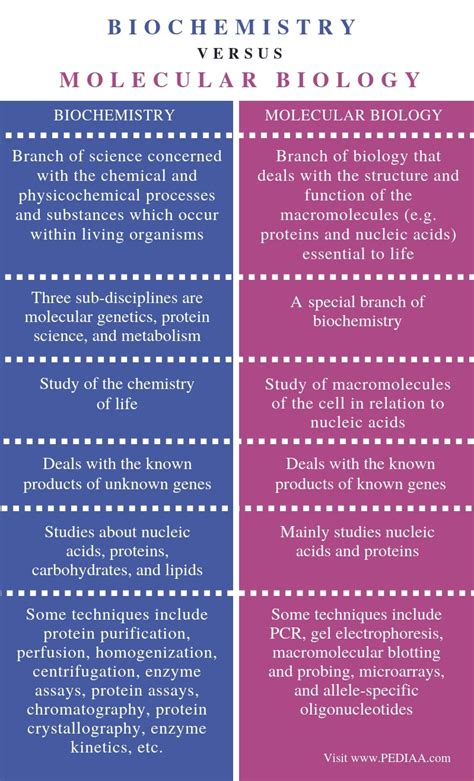Molecular biology and biochemistry, two closely entwined disciplines, delve into the intricate realm of biological molecules and their interactions, shaping our understanding of life at its fundamental level. While distinct in their focus, these fields complement each other, providing a deeper insight into the molecular basis of cells, organisms, and the living world as a whole.

Molecular Biology: Exploring the Architecture of Life
Molecular biology unveils the structure, function, and regulation of genetic material, DNA, and RNA. It investigates the intricate mechanisms of gene expression, including transcription and translation, deciphering the genetic code that orchestrates the synthesis of proteins. By understanding the complex relationships between genes and the proteins they encode, molecular biologists delve into the very essence of biological inheritance, disease mechanisms, and potential therapeutic interventions.
Biochemistry: Laying the Foundation for Cellular Processes
Biochemistry delves into the chemical reactions and processes that sustain life within cells. It focuses on the structure, function, and metabolism of molecules essential for cellular function, including carbohydrates, proteins, lipids, and nucleic acids. Biochemists study the intricate interplay of these molecules in metabolic pathways, energy production, and the regulation of cellular processes. Their research provides insights into the biochemical basis of disease, the development of novel drugs, and the optimization of industrial processes.
Interplay and Convergence
While molecular biology and biochemistry have distinct scopes, they converge harmoniously to unravel the intricate workings of living systems. Molecular biologists rely on biochemical techniques to isolate and analyze genetic material, while biochemists delve into the molecular mechanisms of cellular processes. Together, they illuminate the fundamental principles governing gene expression, protein synthesis, and the complex biochemical networks that maintain cellular homeostasis.
Applications in Medicine and Biotechnology
The convergence of molecular biology and biochemistry has revolutionized medicine and biotechnology. Molecular diagnostics, such as DNA sequencing and gene expression profiling, enable early disease detection and personalized treatment strategies. Gene therapy and genetic engineering tools hold promise for correcting genetic defects and treating inherited diseases. In biotechnology, genetic engineering techniques are employed to create new enzymes, pharmaceuticals, and biofuels, unlocking novel solutions to global challenges.
Educational and Career Opportunities
Molecular biology and biochemistry offer a wealth of educational and career opportunities. Graduate programs in these fields equip students with a deep understanding of molecular mechanisms, preparing them for careers in research, industry, and medicine. Graduates can pursue positions in academia, government agencies, pharmaceutical companies, and biotechnology startups, contributing to groundbreaking discoveries and the development of innovative technologies.
| Feature | Molecular Biology | Biochemistry |
|---|---|---|
| Focus | Genetic material, gene expression, and genetic inheritance | Chemical reactions, metabolism, and cellular processes |
| Primary molecules | DNA, RNA, and proteins | Carbohydrates, proteins, lipids, and nucleic acids |
| Techniques | DNA sequencing, gene cloning, PCR | Chromatography, spectroscopy, and enzyme assays |
| Research areas | Gene regulation, genetic disorders, genetic engineering | Metabolism, enzyme kinetics, drug development |
Table 1: Research Objectives and Techniques
| Research Objective | Molecular Biology | Biochemistry |
|---|---|---|
| Understand gene expression | Analyze DNA sequences, study transcription and translation | Determine enzyme activities, study metabolic pathways |
| Diagnose and treat genetic disorders | Map genetic mutations, develop gene therapies | Identify biochemical imbalances, design drugs to correct them |
| Create new biotechnology products | Engineer enzymes, design pharmaceuticals, develop diagnostic tools | Optimize production processes, develop biofuels |
Table 2: Educational Programs
| Degree | Focus | Duration |
|---|---|---|
| Bachelor of Science in Molecular Biology | Genetic material, gene expression | 4 years |
| Master of Science in Biochemistry | Cellular processes, metabolism | 2 years |
| Doctor of Philosophy in Molecular and Cellular Biology | Comprehensive study of molecular mechanisms | 5-7 years |
Table 3: Career Paths
| Career Path | Required Education | Job Responsibilities |
|---|---|---|
| Research Scientist | PhD in Molecular Biology or Biochemistry | Conduct experimental research, publish findings |
| Laboratory Technician | Bachelor’s degree in Molecular Biology or Biochemistry | Perform laboratory experiments, analyze data |
| Medical School Professor | MD with PhD in Molecular Biology | Teach medical students, conduct research |
| Biotechnology Consultant | Master’s degree or PhD in Molecular Biology or Biochemistry | Advise companies on biotechnology applications |
Table 4: Pain Points and Motivations
| Pain Point | Molecular Biology | Biochemistry |
|---|---|---|
| Complexity of genetic material | Difficulty understanding genetic interactions | Complexity of metabolic networks |
| Ethical concerns | Potential misuse of genetic technologies | Potential hazards of metabolic byproducts |
| Research funding | Competition for grants | Competition for research resources |
| Motivation | Advance our understanding of biological processes | Improve human health and well-being |
By combining molecular biology and biochemistry, researchers can generate innovative ideas for new applications. For example, the use of CRISPR-Cas9 gene editing technology in combination with metabolic engineering techniques could create novel antimicrobial peptides or antibiotics. This approach could address the growing threat of antimicrobial resistance, unlocking new therapeutic strategies to combat infectious diseases.
Molecular biology and biochemistry, two pillars of life sciences, provide a multifaceted understanding of the molecular basis of life. Their intertwined nature enables breakthroughs in medicine, biotechnology, and our fundamental understanding of the living world. As these fields continue to advance, we anticipate exciting new discoveries that will shape the future of healthcare, technology, and our interconnectedness with the natural world.
